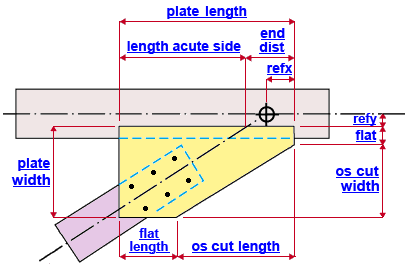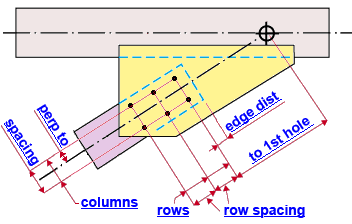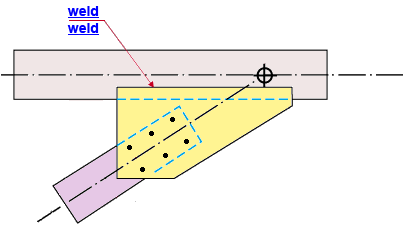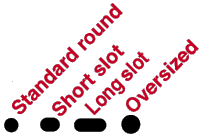"  Gusset One Member Square " & "
Gusset One Member Square " & "  Brace Connection To Gusset " & "
Brace Connection To Gusset " & "  HB Conn 2 "
HB Conn 2 "
| The gusset for a W tee or wide flange or double-angle horizontal brace to a beam's top flange is designed per " |
|
|||
| " (gusset plate dimensions and location)  |
" (holes for field bolting the brace to the gusset)  |
||
| " (shop weld, gusset to beam flange)  |
|
||
Connection Guide: Click here for related screen shots.
User Defined Connections: Settings that are locked (
) in a user defined connection file will automatically be locked on a member edit window for which that file is the " Input connection type ." You can, if you so choose, manually lock additional settings on the member edit window, and your changes will be retained, through multiple processes, so long as you do not change to a different connection then switch back to the original user defined connection.
Horizontal Brace Edit: To change a setting, first set it to locked (
). Related settings that are unlocked (
) may be updated, and the "
Left/Right end limit state " calculations will be updated. Settings that are locked (
) will not be changed by connection design , even if doing so might prevent a connection failure.
Connection design locks :
| Locks not dimensioned or called out on the drawings are marked ( not depicted ). |
![]() Gusset One Member Square
Gusset One Member Square
( WT, 2L or W horizontal brace to a beam's top flange )
Plate thickness ( not depicted ): The distance between the two faces of the gusset plate. This is The " Material thickness " of the rectangular plate gusset plate material.
Width ( plate width ): The distance between the framing edge of the gusset plate and the edge of the gusset plate that is parallel and opposite to the framing edge (see example ).This distance is perpendicular to the work line of the supporting beam.
Length ( plate length ): The length of the framing edge of the gusset plate (the edge that welds to the beam flange -- see example ). Gusset plate " Length " is measured parallel with the work line of the beam.
Refx: The positive (+) or negative (-) distance (parallel with the supporting beam's work line ) from the work point of the horizontal brace to the corner of the framing edge of the gusset plate that this end of the horizontal brace points toward (this also happens to be the nearest corner -- see example ). A " Refx " of ' 0 ' aligns the corner of the gusset plate with the brace's work point. Entering a positive (+) distance moves the corner of the gusset plate parallel with the work line of the beam toward the opposite end of the horizontal brace. Entering a negative (-) distance moves the gusset plate parallel with the work line of the beam in the direction that this end of the horizontal brace points toward. Changing the " Refx " moves the plate only, not the holes on the plate.
Refy: The positive (+) or negative (-) distance (perpendicular to the framing edge of the gusset plate) from the work point for this end of the horizontal brace to the framing edge of the gusset plate (see example ). A " Refy " of ' 0 ' aligns the framing edge of the gusset plate with the work point. Entering a positive (+) distance moves the gusset plate away from the work point toward the opposite end of the horizontal brace. Entering a negative (-) distance moves the gusset plate in the direction that this end of the horizontal brace points toward. Changing the " Refy " moves the plate only, not the holes on the plate.
Obtuse side clip cut width ( os cut width ): The distance (measured perpendicular to the work line of the beam) between the two corners of the clip cut that is included in the obtuse angle at the intersection of the brace to the beam. As the example shows, the gusset plate is divided into an acute side and an obtuse side by the work line of the brace. The obtuse side of the gusset plate is the side contained by the obtuse angle between the beam and the brace.
Obtuse side clip cut length ( os cut length ): The distance (measured parallel with the work line of the beam) between the two corners of the clip cut that is included in the obtuse angle at the intersection of the brace to the beam. As the example shows, the gusset plate is divided into an acute side and an obtuse side by the work line of the brace. The obtuse side of the gusset plate is the side contained by the obtuse angle between the beam and the brace.
Flat width ( flat ): The distance (perpendicular to the work line of the supporting beam) between the two corners of the flat edge. The flat edge has a 90 degree corner at the framing edge of the gusset plate and another corner at the obtuse side clip cut (see example ).
Flat length: The length of the edge of the gusset plate that is parallel to and opposite to the framing edge of the gusset plate (see example ). This distance is parallel with the work line of the supporting beam.
End distance ( end dist ): The distance (parallel with the work line of the supporting beam) from the point where the work line of the brace intersects the framing edge of the gusset plate to the corner of the framing edge of the gusset plate that this end of the horizontal brace points toward (the obtuse-side corner of the framing edge -- see example ).
Length acute side: The distance (parallel with the work line of the supporting beam) from the point where the work line of the brace intersects the framing edge of the gusset plate to the corner of the framing edge that is on the acute side of the brace. As the example shows, the gusset plate is divided into an acute side and an obtuse side by the work line of the brace. The acute side of the gusset plate is the side contained by the acute angle between the beam and the brace. In other words, the " Length acute side " is the length of the gusset plate's framing edge that is on the acute side of the brace.
![]() Brace Connection To Gusset
Brace Connection To Gusset
( WT, 2L or W horizontal brace to a beam's top flange )
Bolt diameter ( not depicted ): You can either type in any diameter (inches or mm), or you can select a bolt diameter from the combo box (
). The diameters that are listed in the combo box come from Home > Project Settings > Job > Bolt Settings > the " Available bolts " list. The bolt diameter entered here, together with the " Hole type " entered below, set the diameter of holes the bolts go into.
Hole type ( not depicted ): Standard round or Short slot or Oversized or Long slot or User slot #1 or User slot #2 . This sets the type of hole through which field bolts will fasten the horizontal brace to the gusset plate.

Rows: The number of holes in each column of holes. Entering ' 0 ' removes the holes. For the angle brace shown in the example above, the number of " Rows " is ' 3 '.
Distance to 1st hole along brace ( to 1st hole ): The distance (parallel with the work line of the horizontal brace) from the work point to the center of the nearest row of holes (see example ).
Hole spacing along brace ( row spacing ): The distance between the centers of any two adjacent holes in the same column of holes (see example ). Bolt row spacing on a horizontal brace gusset plate runs parallel with the work line of the brace.
End connection failure message: Invalid bolt spacing
Edge distance along brace ( edge dist ): The distance from the edge of the brace material that is nearest the brace work point to the center of the first hole in that same brace material. This distance is measured parallel with the work line of the horizontal brace.
Columns: The number of columns of holes through the gusset plate.These holes are used for field bolting the horizontal brace to the gusset. Bolt column spacing runs perpendicular to the work line of the horizontal brace. For the horizontal brace in the example above, the number of " Columns " is ' 2 '.
Distance to 1st hole perpendicular to brace ( perp to ): The distance from the work line of the horizontal brace to the nearest column of holes. For two columns of holes, such as is shown in the example above, if you enter a value that is half the " Hole spacing perpendicular to brace ," the two hole columns will each be placed this same distance from the work line.
Hole spacing perpendicular to brace ( spacing ): Column spacing. This is the distance (center to center) between any two columns of holes (see example ). Bolt column spacing runs perpendicular to the work line of the horizontal brace. Holes within an individual column run parallel with the work line.
![]() HB Conn2
HB Conn2
(WT, 2L or W horizontal brace, shop weld, gusset to a beam's top flange)
Weld size ( weld ): The weld size used to shop weld the framing edge of the gusset plate to the top flange of the beam. This is also the weld size used to weld the under side of the gusset plate to the forward edge of the beam's top flange, which is shown with a blue dashed line ( - - - - - ) in the example . The gusset plate for a horizontal brace to beam flange is detailed with the beam and field bolted to the brace.







